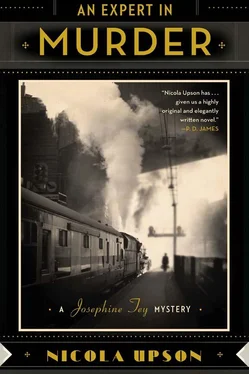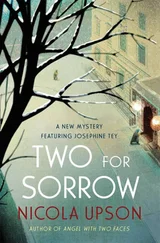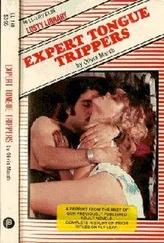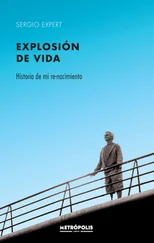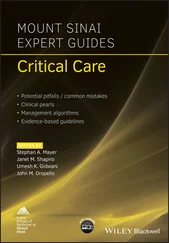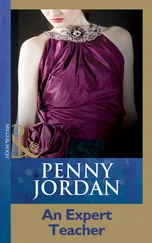Nicola Upson - An Expert in Murder
Здесь есть возможность читать онлайн «Nicola Upson - An Expert in Murder» весь текст электронной книги совершенно бесплатно (целиком полную версию без сокращений). В некоторых случаях можно слушать аудио, скачать через торрент в формате fb2 и присутствует краткое содержание. Жанр: Старинная литература, на английском языке. Описание произведения, (предисловие) а так же отзывы посетителей доступны на портале библиотеки ЛибКат.
- Название:An Expert in Murder
- Автор:
- Жанр:
- Год:неизвестен
- ISBN:нет данных
- Рейтинг книги:3 / 5. Голосов: 1
-
Избранное:Добавить в избранное
- Отзывы:
-
Ваша оценка:
- 60
- 1
- 2
- 3
- 4
- 5
An Expert in Murder: краткое содержание, описание и аннотация
Предлагаем к чтению аннотацию, описание, краткое содержание или предисловие (зависит от того, что написал сам автор книги «An Expert in Murder»). Если вы не нашли необходимую информацию о книге — напишите в комментариях, мы постараемся отыскать её.
An Expert in Murder — читать онлайн бесплатно полную книгу (весь текст) целиком
Ниже представлен текст книги, разбитый по страницам. Система сохранения места последней прочитанной страницы, позволяет с удобством читать онлайн бесплатно книгу «An Expert in Murder», без необходимости каждый раз заново искать на чём Вы остановились. Поставьте закладку, и сможете в любой момент перейти на страницу, на которой закончили чтение.
Интервал:
Закладка:
Like all outsiders who are suddenly welcomed into a club to which they doubt their right to belong, Hedley was well versed in the peculiar language of theatre and revered its traditions and rituals. Each night, he took great pleasure in carefully preparing the ground for the Ricardians, an exclusive group, established in the early days of the production, whose membership was restricted to the three actors left on stage towards the end of Richard of Bordeaux . The rules of the club were strictly observed after all 68
shows except matinees, and it was Hedley’s job – or McCracken’s in his absence – to place a small table and three chairs in the wings during the final act. Lewis Fleming, as Bolingbroke, was the first of the group to make his final exit, and would open a waiting bottle of claret, the quality of which had improved dramatically as the play’s success grew; the actor who played the King’s loyal servant was next off and would dutifully pour the wine into the waiting glasses while John Terry paused on stage to make the most of the bitterness and regret contained in Richard’s closing lines. As the play finished, Terry joined the other two for a toast to the next performance and, after the cast took its many curtain-calls, all three Ricardians returned to savour the rest of the bottle.
Tonight, when Aubrey took to the stage for his customary cameo appearance as the guard – a role that Hedley often played himself – the club’s membership would be extended to four and, as the producer drank nothing but Scotch, it was the junior stage hand’s task to ensure that a single malt was added to the inventory before he went off duty after the matinee. The sense of having thrown away his place in this little world haunted Hedley even more than the prospect of being handed over to the police, and he was entirely at Aubrey’s mercy. He would kill for a second chance, he thought, as he placed the decanter on the shelf next to the claret, ready for the evening performance.
69
Five
Penrose sat at his desk on the third floor of New Scotland Yard and stared at the collection of bleak photographs laid out in front of him. Fallowfield must have conveyed his instructions to the letter, because the photographer had been relentless in his thoroughness: in stark black and white, the camera’s handiwork offered death from every angle, challenging him to erase the question marks which were all over that small railway carriage, and preserving the scene for those who might need to comment later on whatever answers he came up with. As detailed as the pictures were, his own memory really needed no material reminders of what he was dealing with: it would be a long time before a far more intense image of this particular death was erased from his memory. In his head, he heard his superior’s familiar words of warning: ‘You only see what you look for, and you only look for what is already in your mind.’ The trouble was, his mind was a blank. Rarely had he been so without inspiration in a new case, lacking any instinct other than a sense that things would get worse before they got better.
He turned now to the carefully labelled personal effects which, if he only knew how to read them, told the story of the last few hours in Elspeth Simmons’s life. Taken out of context and placed in uniform evidence bags, her things conveyed little of the warmth and animation which, according to Josephine, had characterised the girl in life. There was a handkerchief, a powder compact and comb, a packet of Symington’s Jelly Crystals and another of Mackintosh Toffees, a purse and a small pile of loose change, made up of two half-crowns, two sixpences, a shilling, four pen-71
nies and a halfpenny, and the magazine that had linked Elspeth to Josephine on the day she died – all the paraphernalia of a young woman on the move and, with hindsight, touching in its normality. What he found more interesting, though, were the note and the flower which hinted at a promise of affection, even love. He looked at the iris, with its striking triad of dark purple petals, and wondered what it had meant to her or to the person who sent it.
How did she feel when she received it? And how would she have felt if it was her lover’s face she had looked into as the life drained out of her? He hoped to put a name to that face when he questioned Frank Simmons and his wife in a couple of hours’ time.
There was nothing out of the ordinary about the bag itself, except that the contents scarcely seemed to justify its outlandish size. Perhaps the dolls were the answer. It certainly made more sense for them to have been hers rather than carried by a killer for whom speed and invisibility were of the essence; the fingerprint report would at least tell him whether or not she had handled them. He looked at the miniature king and queen, less lifelike now in their forensic wrapping, and gave an involuntary shudder. There was something unnerving about the violence with which the female doll’s hand had been broken off and discarded, but perhaps the gesture was nothing more than spite towards the victim, a scorning of Elspeth’s love for the artificial passions of the stage rather than a sinister strike against Josephine herself. As much as he felt for the dead girl, a lovers’ quarrel in which the dolls simply represented a mockery of her relationship would be a welcome explanation for her murder.
A brusque knock at the door interrupted his thoughts and, without waiting for a response, Sir Bernard Spilsbury came into the room. Others might have been surprised to see the celebrated Home Office Pathologist at the Yard on a Saturday but, to all intents and purposes, he was also a member of CID and behaved like any other hard-working member of the team. At fifty-seven, he often spoke of retirement but was actually busier than ever, driven hard by the police at his own insistence. In all the years Penrose had worked alongside Spilsbury, he had never known him 72
to refuse a call. His reports were not quite as prompt as they used to be, and age had made him a little excessive in his thoroughness, but Penrose was always prepared to wait a little longer to hear opinions from a man for whom he held tremendous respect.
Although by no means infallible, Spilsbury had proved to him on countless occasions that medicine had its value even in the face of death, that it was a path to truth even when life had been outwit-ted by evil – and that justice could prevail if someone paved the way for it with diligence and care.
‘Sorry I’m late, Archie, but the traffic down Gower Street was diabolical. Of course, if the Metropolitan Police thought it worthwhile to catch up with the rest of the civilised world and build a laboratory of its own, then you’d have had your report by now and you might even be halfway to getting another killer off the streets. But who am I to criticise?’
Penrose smiled at the rebuke, which was invariably the first thing Spilsbury uttered when he arrived at Scotland Yard. The pathologist’s opinion that Britain lagged behind other countries when it came to a commitment to forensic evidence was well known and, Penrose believed, fully justified. Among many of his colleagues there was still a prejudice against importing too much science into an investigation even though most were coming to rely on such developments as a matter of course; the analysis of dust in a suspect’s pockets or mud on his boots was all very well, they would say if asked, but there was still a preference for direct rather than scientific methods of proving guilt and, even if the force as a whole could be persuaded that forensics were an aid to rather than replacement for observation and patience, the argument that English judges and juries were inclined to be dis-trustful of laboratory evidence had yet to be overcome. If anybody could change that, though, Spilsbury could; no name was more closely associated with violent or mysterious death. He had a quiet authority and a core of steel, yet it would have been hard to imagine a more affable and sympathetic character.
Читать дальшеИнтервал:
Закладка:
Похожие книги на «An Expert in Murder»
Представляем Вашему вниманию похожие книги на «An Expert in Murder» списком для выбора. Мы отобрали схожую по названию и смыслу литературу в надежде предоставить читателям больше вариантов отыскать новые, интересные, ещё непрочитанные произведения.
Обсуждение, отзывы о книге «An Expert in Murder» и просто собственные мнения читателей. Оставьте ваши комментарии, напишите, что Вы думаете о произведении, его смысле или главных героях. Укажите что конкретно понравилось, а что нет, и почему Вы так считаете.
